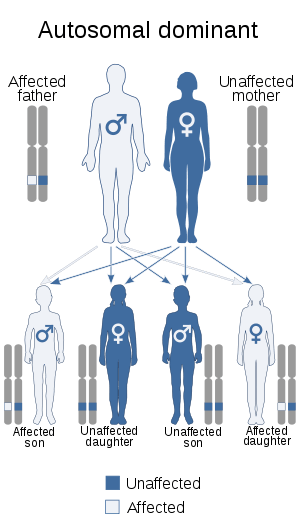Adermatoglyphia
| Adermatoglyphia | |
|---|---|
| Synonyms | Immigration delay disease |
 | |
| Adermatoglyphia is inherited in an autosomal dominant manner | |
Adermatoglyphia is an extremely rare genetic disorder that causes a person to have no fingerprints. There are only four known extended families worldwide that are affected by this condition.
In 2011, the description of a case of a person from Switzerland lacking fingerprints as an isolated finding was published.[1] The phenotype was mapped to chromosome 4q22. In the splice-site of a 3' exon of the gene for SMARCAD1-helicase, a point mutation was detected. It results in a shortened form of the skin-specific protein. The heterozygous mode of mutation suggests an autosomal dominant mode of inheritance.[2]
Other conditions can cause a lack of fingerprints, but unlike them, adermatoglyphia has no other side effects.[3] Mutations in helicases are involved in other rare genetic diseases, for instance Werner syndrome.
References
- ↑ Burger B, Fuchs D, Sprecher E, Itin P (May 2011). "The immigration delay disease: adermatoglyphia-inherited absence of epidermal ridges". J. Am. Acad. Dermatol. 64 (5): 974–80. doi:10.1016/j.jaad.2009.11.013. PMID 20619487.
- ↑ Nousbeck J, Burger B, Fuchs-Telem D, et al. (August 2011). "A mutation in a skin-specific isoform of SMARCAD1 causes autosomal-dominant adermatoglyphia". Am. J. Hum. Genet. 89 (2): 302–7. doi:10.1016/j.ajhg.2011.07.004. PMC 3155166. PMID 21820097.
- ↑ Kaufman, Rachel (August 9, 2011). "Mutated DNA Causes No-Fingerprint Disease". National Geographic News.
| Look up adermatoglyphia in Wiktionary, the free dictionary. |
External links
| Classification | |
|---|---|
| External resources |